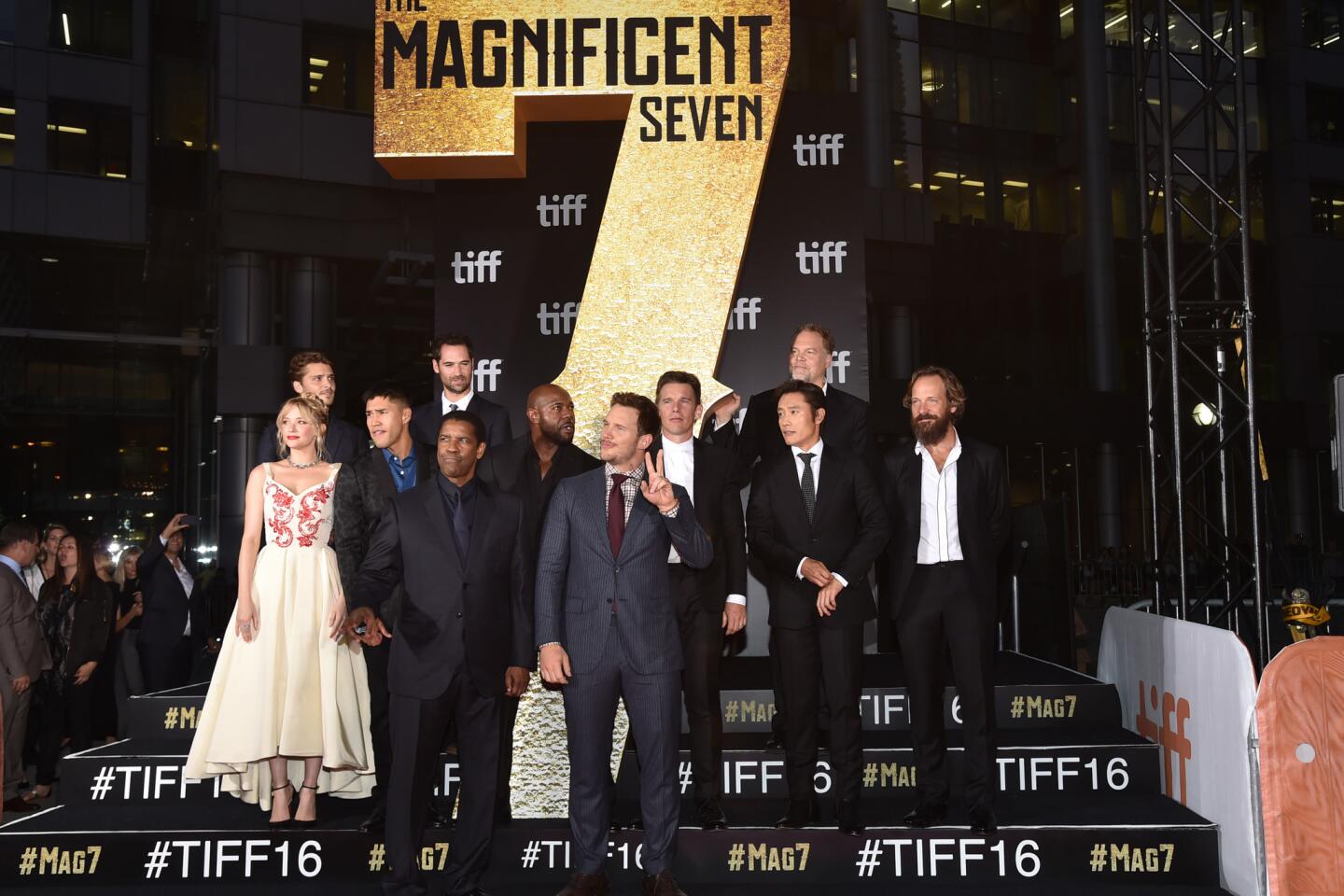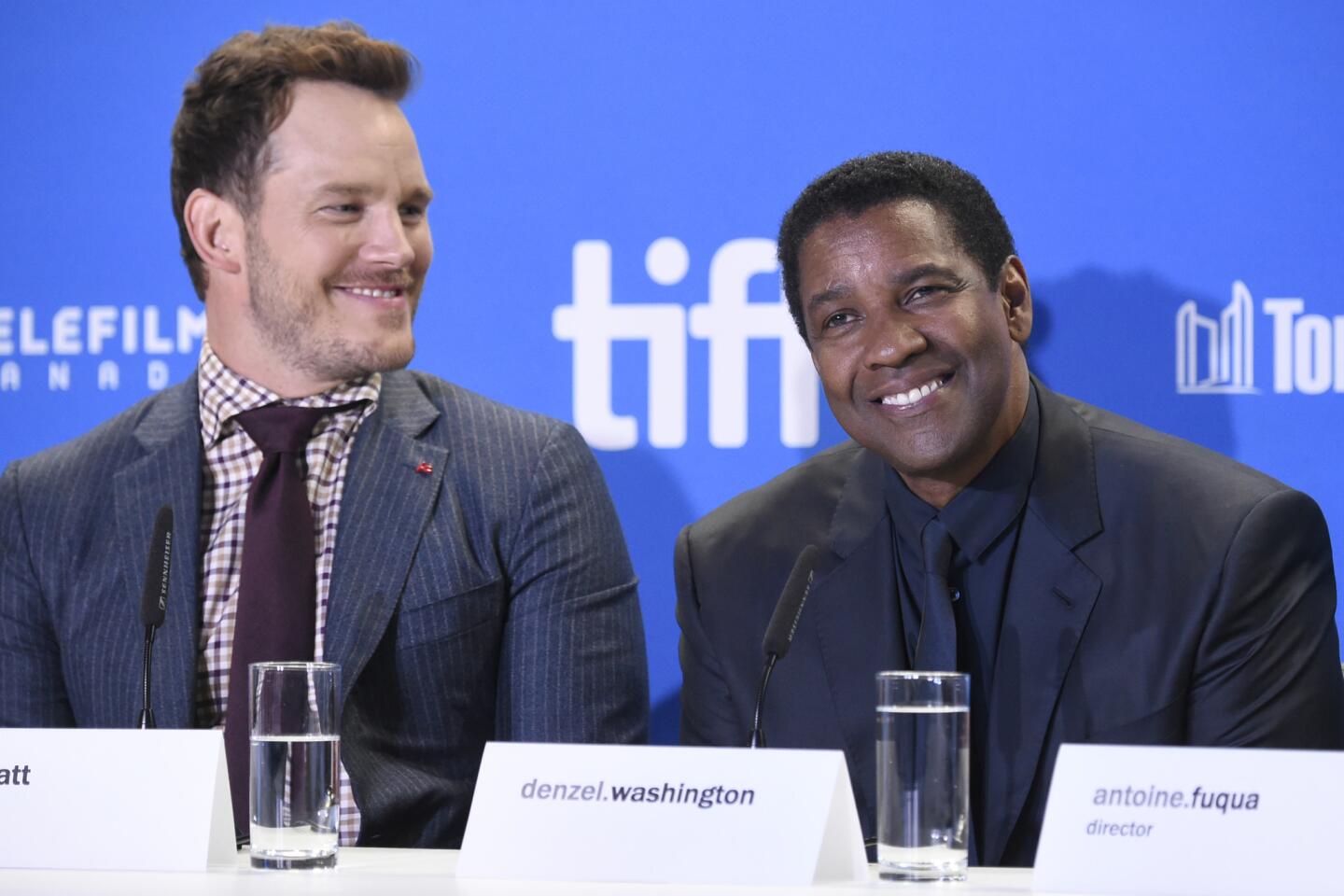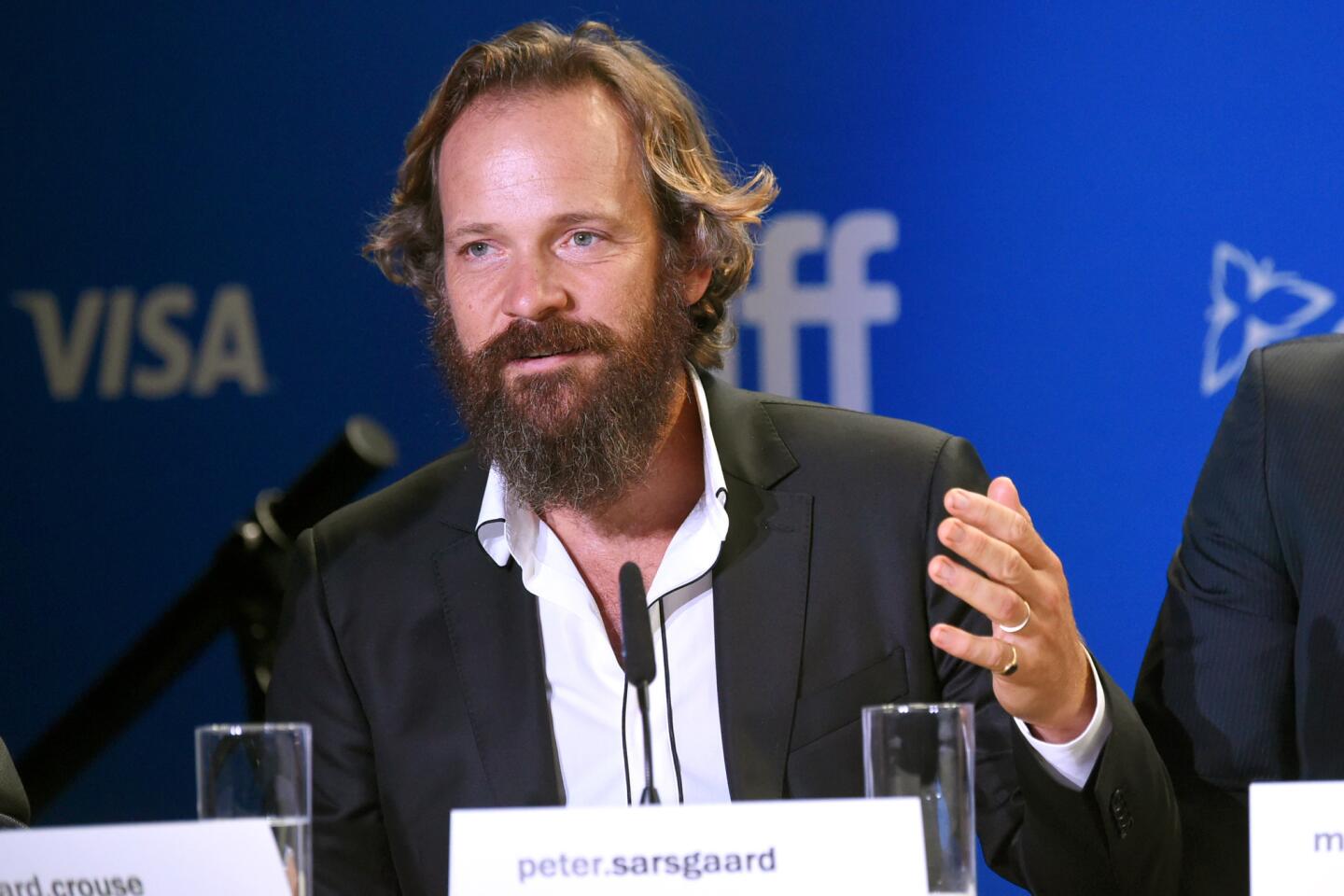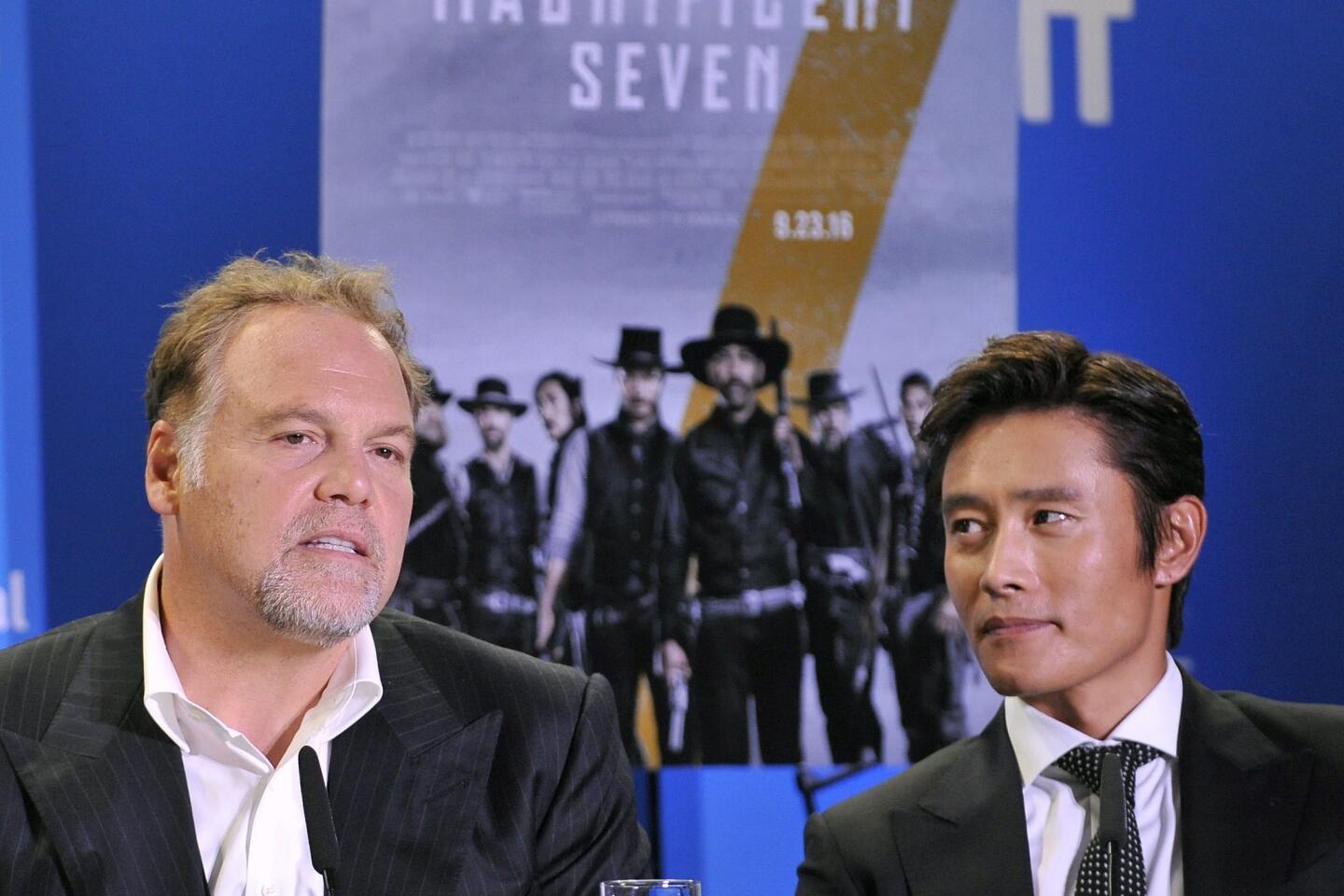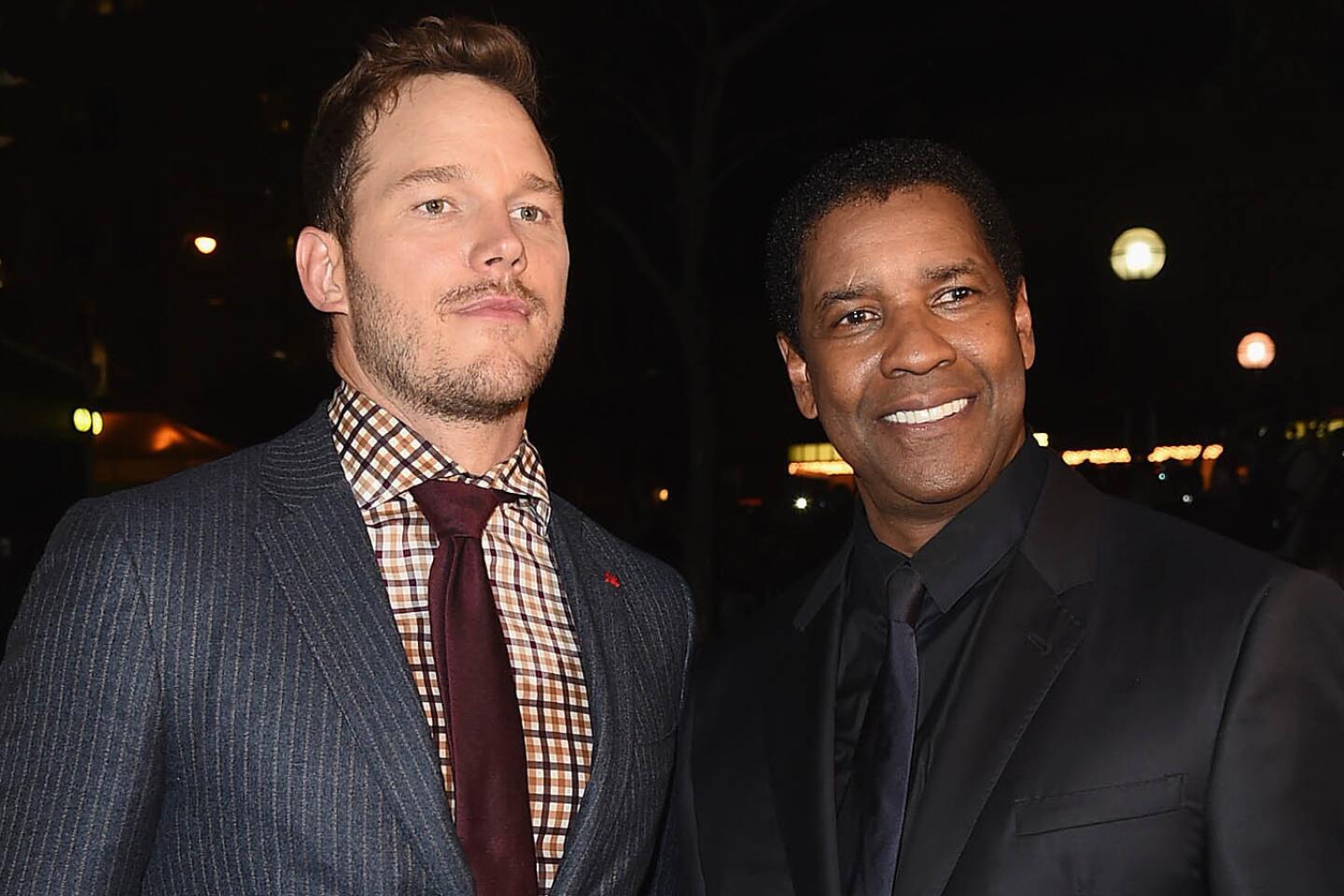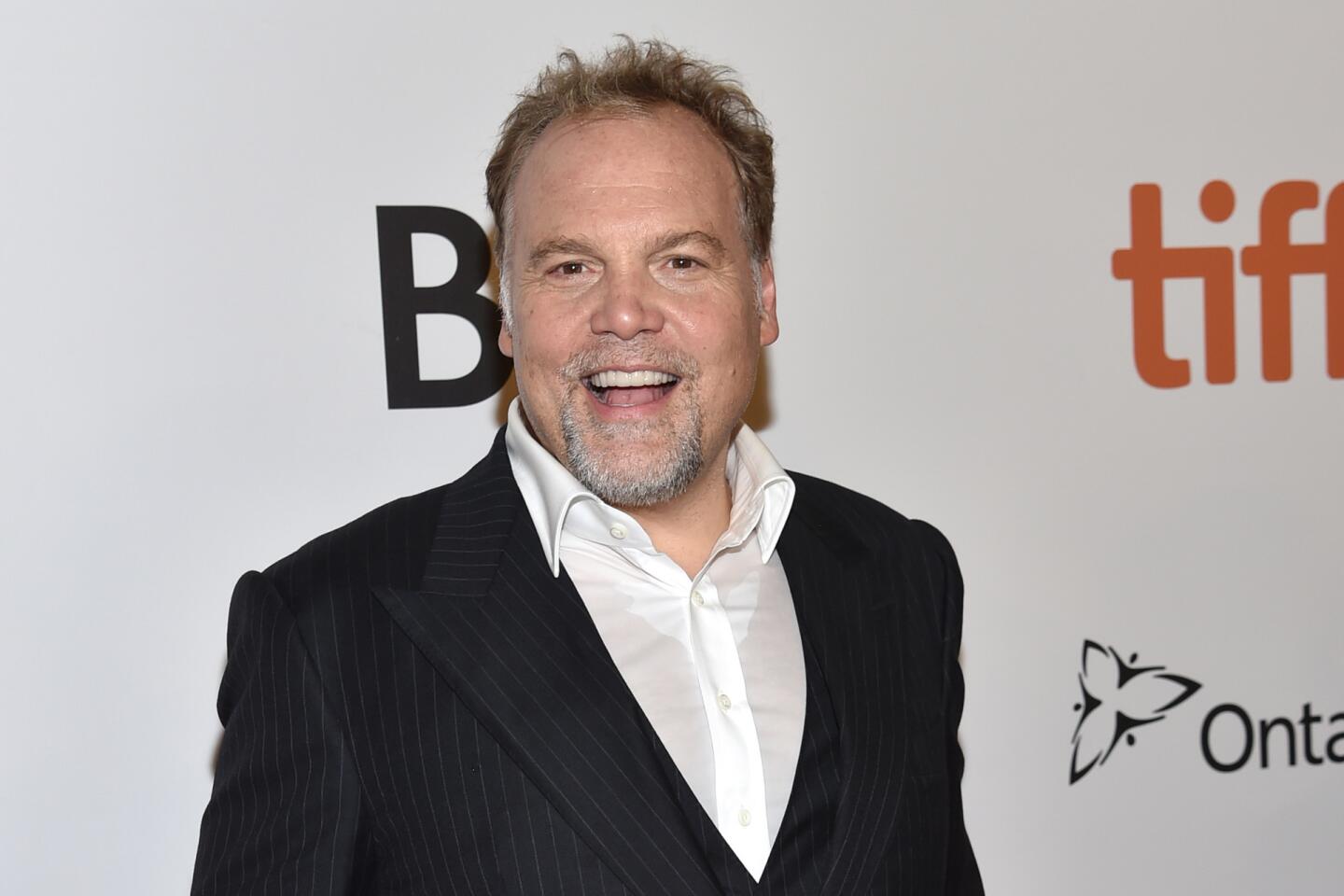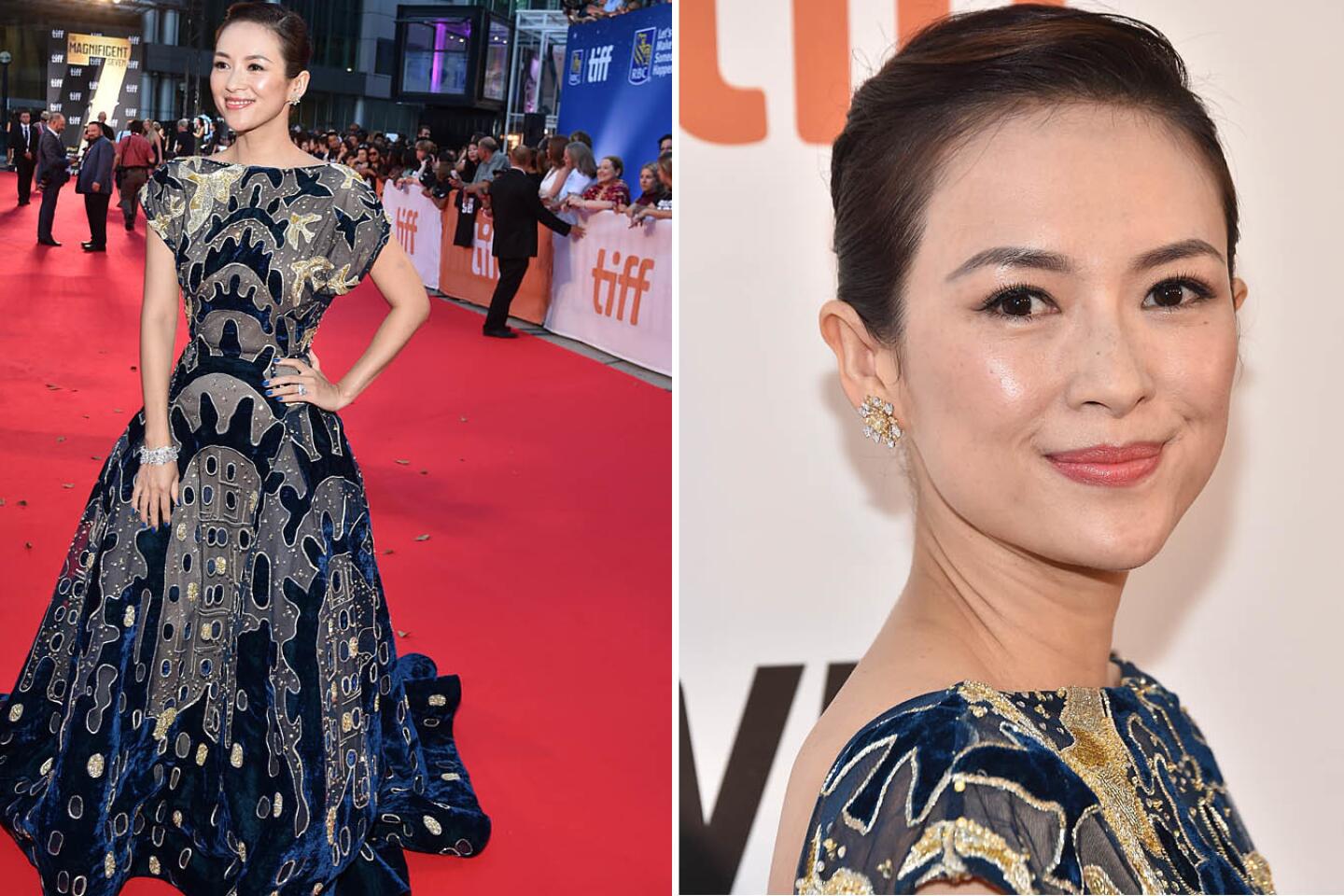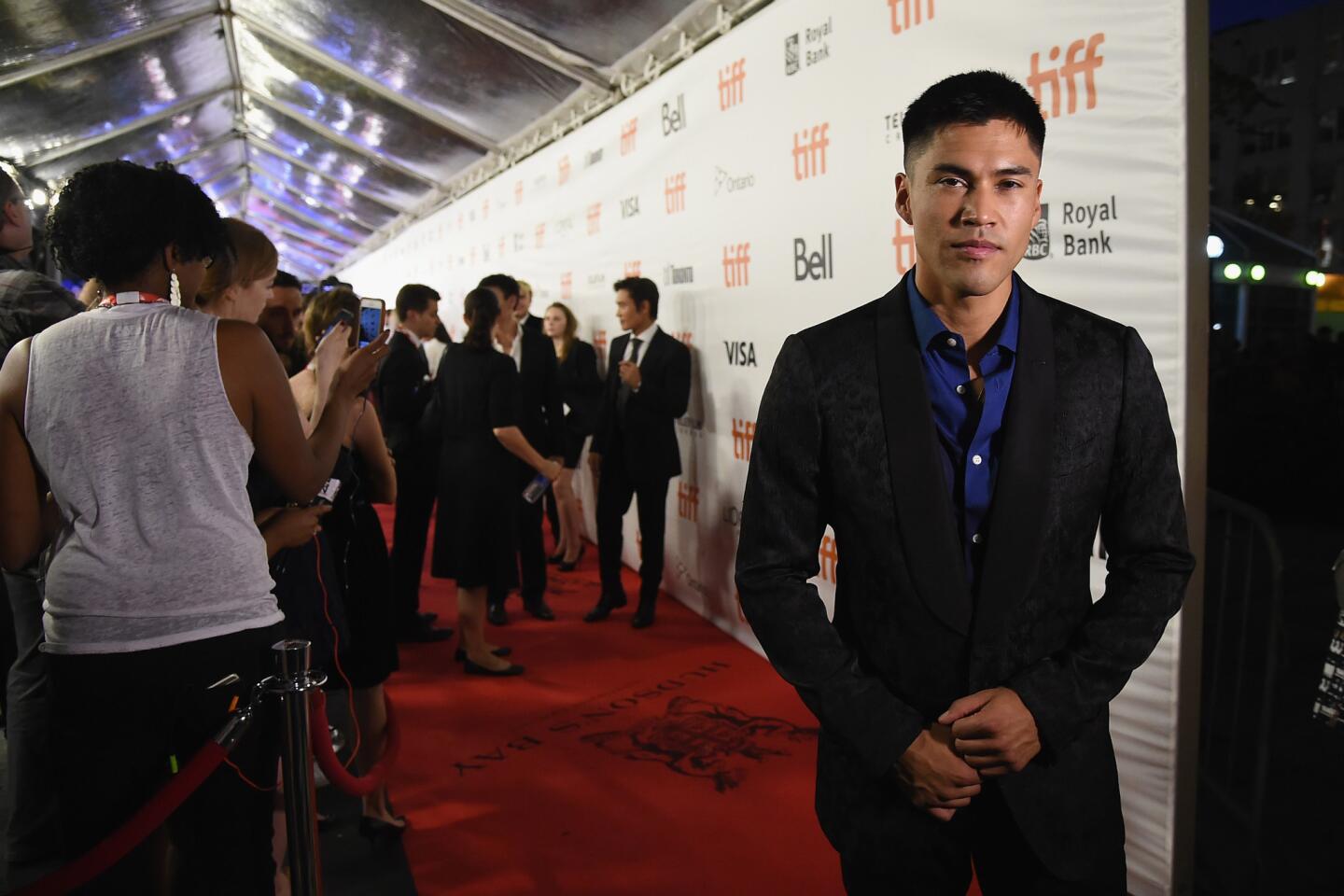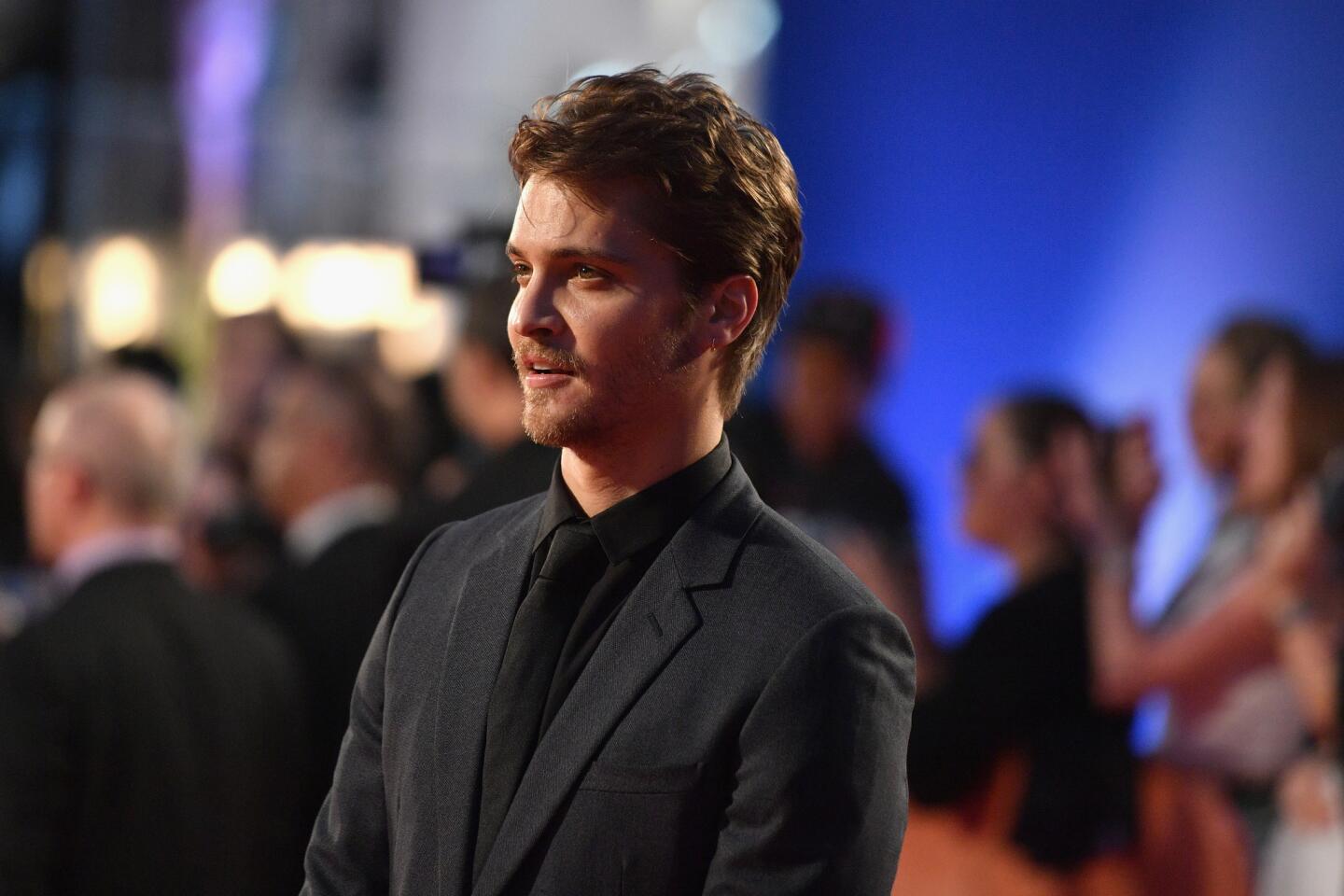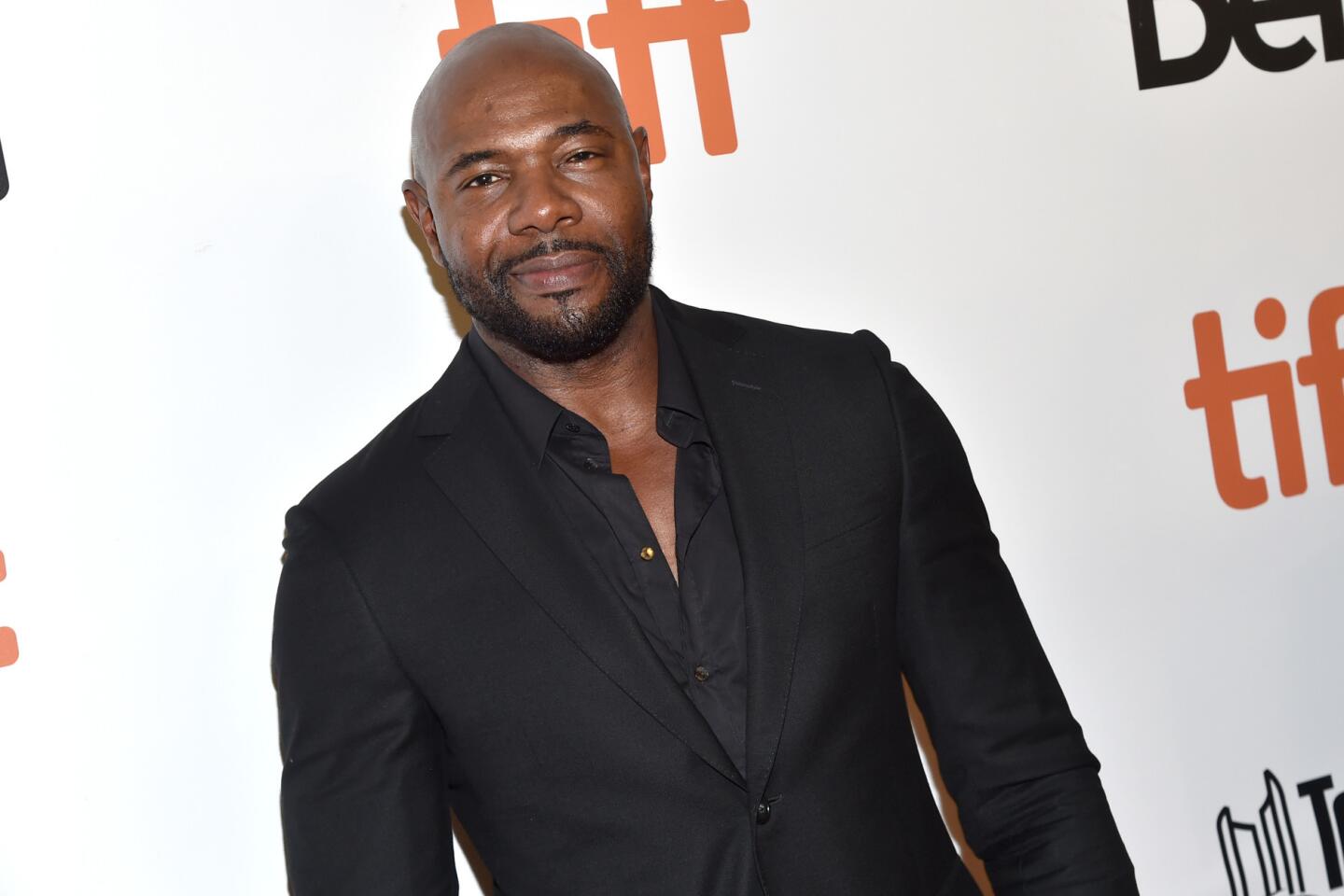Toronto 2016: Off to a violent start with ‘Magnificent Seven,’ ‘Free Fire’
- Share via
Reporting from Toronto — Nostalgia and reinvention, two seemingly oppositional yet highly complementary forces in Hollywood, seem to be dominating some of the fall season’s major film events — or at least their opening-night attractions.
Two weeks ago, the Venice Film Festival opened with the world premiere of Damien Chazelle’s exquisite musical “La La Land,” a sublimely old-fashioned yet newfangled attempt to revive and renew the audience’s affection for a mostly bygone tradition of filmmaking. At its most heart-stopping moments, “La La Land” takes on the ethereal quality of an L.A. ghost story, one in which Emma Stone and Ryan Gosling find themselves haunted by the lingering and benevolent spirits of Stanley Donen and Jacques Demy.
Rapturously received in Venice and in Telluride (where it screened over Labor Day weekend), “La La Land” will make its next stop here in Toronto. That festival kicked off its own star-studded proceedings Thursday evening with the world premiere of Antoine Fuqua’s “The Magnificent Seven,” a much stiffer and far less imaginative attempt to reclaim a largely abandoned genre from the studio ash heap.
FULL COVERAGE: Toronto International Film Festival
To be sure, Fuqua’s film (which my colleague Kenneth Turan will review in full when it opens in theaters Sept. 23) is not without its classical, old-school western virtues. Before the Thursday afternoon media screening, a friend jokingly wondered if any of the seven would die at the end, thus endangering Sony’s hopes of a full-blown franchise (“The Magnificent Eight,” “The Magnificent Nine,” etc.). Without spoiling the results of the movie’s sturdy if rather mechanically staged shootout, it’s worth noting that the final protagonist death count is the same here as it was in John Sturges’ 1960 classic and its original template, Akira Kurosawa’s immortal “Seven Samurai” (1954).
What’s new about this “Magnificent Seven” — and what likely made it an especially attractive opening-night proposition for Toronto — is the showy diversity of the ensemble. Besides headliner Denzel Washington (in his third and least interesting collaboration with Fuqua, after “Training Day” and “The Equalizer”), the cast includes the Korean superstar Lee Byung-hun, the Mexican American actor Manuel Garcia-Rulfo, and Martin Sensmeier, a Native American actor of Tlingit, Koyukon-Athabascan and Irish descent. (Rounding out the principal cast are Chris Pratt, Ethan Hawke, Vincent D’Onofrio and Haley Bennett, in the role of a not-so-docile frontierswoman.)
At a news conference, Fuqua and his actors waved away the idea that they were pushing some sort of diversity agenda, which is understandable enough; no one wants to be accused of turning an action movie into an affirmative-action movie. Washington did allow that there was room in the canon for still further representational tinkering: “You can make a ‘Magnificent Seven’ with all women,” he said, tacitly acknowledging a trend that began with this summer’s all-female “Ghostbusters” remake, and which will continue with an all-female “Ocean’s Eleven” reboot starring Sandra Bullock.
For anyone who has ever decried the disproportionate number of movies made for, by and about white men, it’s hard not to appreciate these projects and the sentiments behind them. The problem with such baby-steps correctives is that, as Hollywood keeps raiding its back catalog and forcing underrepresented talents to conform to standard entertainment templates, the push for diversity is being placed at the mercy of a creatively moribund system — and that unfortunate dynamic is very much on display in “The Magnificent Seven.”
The Old West was, of course, widely contested and extremely complex terrain — geographically, morally, racially — and Fuqua has made little effort to tame it into dramatic submission. As the Hollywood Reporter critic Todd McCarthy noted in his review, the film misses “a real opportunity to provide a small taste of the past experiences of such diverse men on the frontier.” In short, color-blind casting gets us only so far when the biggest personality on screen is a Gatling gun. Unable or unwilling to flesh out its outlaws in a more-than-superficial manner, “The Magnificent Seven” becomes a well-meaning exercise in cinematic tokenism — an unwelcome reminder of how the West was one-note.
Festival-goers who shrugged off the opening-night movie could have found some sly counter-programming in the form of Ben Wheatley’s gleefully unhinged “Free Fire,” which kicked off the festival’s always popular Midnight Madness sidebar. Like “The Magnificent Seven,” “Free Fire” brings together several armed and dangerous personalities (including another brave woman, this time played by Brie Larson) and builds to what plays like the mother of all shootouts. The difference between Fuqua’s dutiful western and this ultra-violent “Reservoir Dogs”/Looney Tunes mash-up is that here the shootout isn’t the climax to the movie; it is the movie, the result of an arms deal that goes quickly and hideously awry.
As he showed in his savagely funny J.G. Ballard adaptation “High Rise” (a popular Toronto selection last year), Wheatley excels at disaster choreography; he’s a master of the spiraling-out-of-control moment. The assorted toughs and lowlifes in “Free Fire” — they include Armie Hammer, Cillian Murphy, Sam Riley, Sharlto Copley, Michael Smiley and Noah Taylor — are confined to a large warehouse that’s conveniently full of rocks, columns and other large obstacles, ideal for providing cover from ricocheting bullets. (Bring earplugs to the theater; the miss-miss-bang-bang sound design is brilliant — and unbearable.)
The experience of watching this high-concept carnage exercise somehow strikes a balance between bloody exhilaration and total boredom. The actors’ movements — long before the end, they’re dragging their broken, bullet-riddled bodies across the floor — have clearly been blocked to within an inch of their life. It’s a shame, then, that the shooting and editing don’t have a cleaner sense of spatial coherence; even at 90 minutes, there’s too much repetitive mayhem between wisecracks and payoffs. “Free Fire” may be a bravura sick joke of a movie, but even the sickest jokes work better the clearer they’re told.
My grisly first day of screenings also included Ana Lily Amirpour’s dystopian mood piece “The Bad Batch,” which is making its North American premiere here after screening in competition at Venice. Set in a cordoned-off desert wasteland somewhere south of the Texas border, the movie begins with a tense, muted scene of its heroine, Arlen (Suki Waterhouse), having an arm and a leg sawed off by a community of human-eating captors. She barely escapes but will cross paths again with one of them, Miami Man, who’s played by that hulking, incommunicative slab of muscle known as Jason Momoa (basically channeling the Cuban cannibal version of Khal Drogo).
A fable of haves and have-nots that nods in the direction of “Mad Max: Fury Road,” “The Bad Batch” is another politically charged genre mash-up from Amirpour, whose black-and-white feminist vampire thriller “A Girl Walks Home Alone at Night” was one of the most striking debut features of recent years. You can sense some of that singularity here, even if the stunning desert vistas — Amirpour frames her shots and moves the camera with a dreamlike sense of flow — increasingly seem to distract from (and even contribute to) the narrative longueurs. Gossamer-thin storytelling in service of intoxicating wilderness atmosphere is usually my jam, but inside this not-so-bad batch of splendid atmospherics and half-baked ideas, a shorter, better movie is trying to chew its way out.
More to Read
Only good movies
Get the Indie Focus newsletter, Mark Olsen's weekly guide to the world of cinema.
You may occasionally receive promotional content from the Los Angeles Times.
